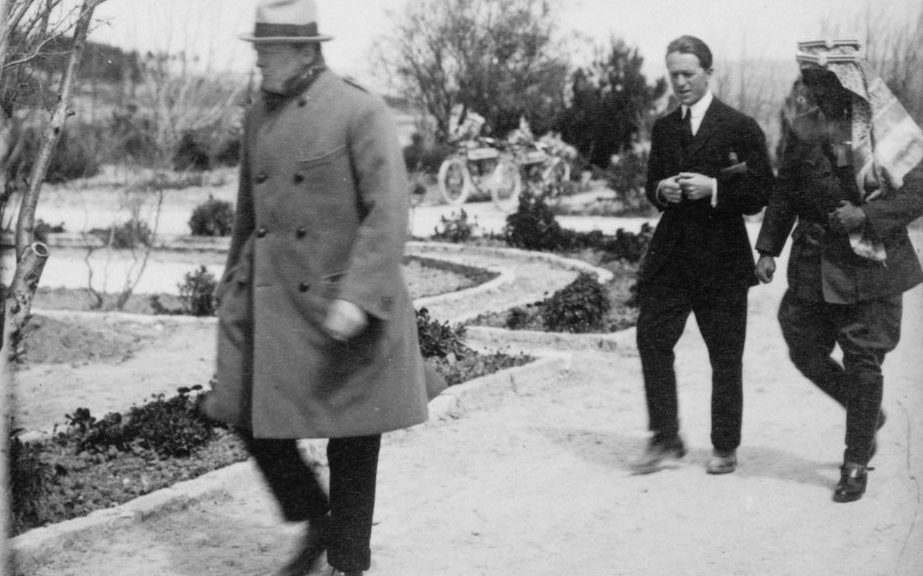
Q&A: Churchill at the Stroke of a Pen: Jordan and the Indian Army
Excerpted from “Creating Jordan with the Stroke of a Pen on a Sunday Afternoon,” Hillsdale College Churchill Project, August 2021.
Q: On creating Transjordan
What is the veracity of this alleged quote by Churchill, which has many versions? “In his later years, he liked to boast that in 1921 he created Transjordan (6/7ths of the British Palestine Mandate, today’s Kingdom of Jordan, ‘with the stroke of a pen, one Sunday afternoon in Cairo.’” The source cited by The New York Times is “Borderlines and Borderlands: Political Oddities at the Edge of the Nation-State,” edited by Alexander C. Diener and Joshua Hagen, page 189.)
I ask because versions of this quote are repeatedly cited by anti-Churchill wallahs as proof for when they indict him as the culprit for the state of the Middle East today. Their point is that Churchill created artificial states to (pick your poison) steal oil, perpetuate British control, create pro-Western dictatorships, keep the Muslim world in a state of constant unrest etc. They never mention that Jordan is comparatively an oasis of serenity relative to its neighbours. —A.M., Delhi
A: Unproven, but not out of character
Churchill occasionally rattled off some provocative remark to tease oversensitive colleagues or see how they reacted. Comments such as “Indians breed like rabbits” or the supposed Tory campaign slogan “Keep England White” (both hearsay with only one source) were at best wisecracks. Lacking much provenance, they are nevertheless accepted by the ignorant as formal proclamations of Churchill’s deeply held beliefs.
Churchill might well have let the “stroke of a pen” remark fly to a colleague. But we can find no published source relative to Transjordan, or the Kingdom of Jordan. Of course, Jordan was a creation of the 1921 Cairo Conference, presided over by Churchill. Good accounts are in David Stafford, Oblivion or Glory: 1921 and the Making of Winston Churchill (2019) and Martin Gilbert, Winston S. Churchill, vol. 4, World in Torment 1917-1922.
The quote as you state it, however, could be a muddled version of what Churchill actually said in Parliament on 24 March 1934. The venue he named was Jerusalem not Cairo:
I have no hostility for the Arabs. I think I made most of the settlements over fourteen years ago governing the Palestine situation. The Emir Abdullah is in Transjordania, where I put him one Sunday afternoon at Jerusalem.
Churchill did not fancy “nation building,” as we call it today. He had no great hope for democracy in the Arab states he set up in 1921. His highest hope was in what became Israel, which he first referred to as a homeland, not a state. Nevertheless, he thought, the West must do what it could, to use its influence for good. After all, that influence is better than some of the other influences that occur from time to time. Suppose the Soviet Union had reorganized the Middle East in 1921?
Another stroke of a pen: India’s military legacy
Sometimes a chase through the Churchill canon yields unrelated but rewarding results. In searching for “stroke of a pen,” I came across this passage by historian Arthur Herman, in his excellent book Gandhi & Churchill, page 497. It refers to the Indian Army Office Corps, where Churchill also played a part. This will be of interest to you and other Indians laboring in the vineyard in search of truth:
For every disgruntled or discouraged subaltern who joined Japan’s puppet Indian National Army, a dozen KCIOs and VCOs served with distinction on every front in the British war effort, from Burma and Eritrea to North Africa and Italy. And the minister of war who created the KCIOs in 1920 had been Winston Churchill. Without realizing it, he had at the stroke of a pen secured India as part of the future Allied cause and created independent India’s military legacy. Churchill never grasped the full magnitude of what he had done, but Gandhi nearly did. Many times over the years he had spoken of brave Indian soldiers who would defend their country and then return home to carry the future burden of freedom.”






